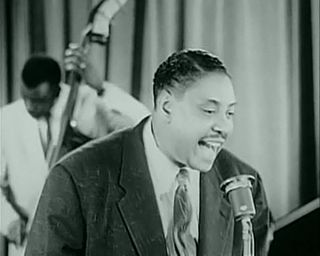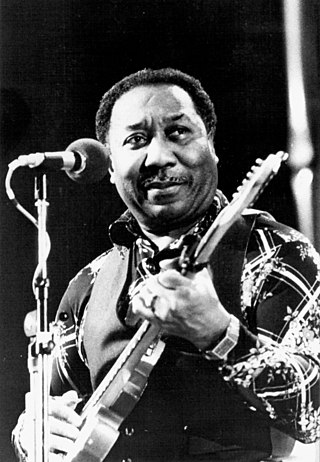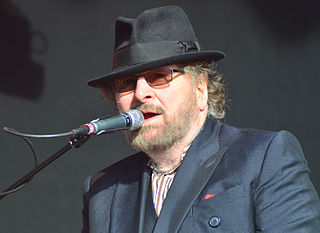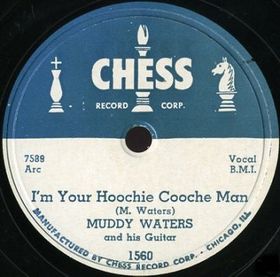
Rhythm and blues, frequently abbreviated as R&B or R'n'B, is a genre of popular music that originated within African-American communities in the 1940s. The term was originally used by record companies to describe recordings marketed predominantly to African Americans, at a time when "rocking, jazz based music ... [with a] heavy, insistent beat" was becoming more popular. In the commercial rhythm and blues music typical of the 1950s through the 1970s, the bands usually consisted of a piano, one or two guitars, bass, drums, one or more saxophones, and sometimes background vocalists. R&B lyrical themes often encapsulate the African-American history and experience of pain and the quest for freedom and joy, as well as triumphs and failures in terms of societal racism, oppression, relationships, economics, and aspirations.

William James Dixon was an American blues musician, vocalist, songwriter, arranger and record producer. He was proficient in playing both the upright bass and the guitar, and sang with a distinctive voice, but he is perhaps best known as one of the most prolific songwriters of his time. Next to Muddy Waters, Dixon is recognized as the most influential person in shaping the post–World War II sound of the Chicago blues.

McKinley Morganfield, known professionally as Muddy Waters, was an American blues singer and musician who was an important figure in the post-World War II blues scene, and is often cited as the "father of modern Chicago blues". His style of playing has been described as "raining down Delta beatitude".

Jimmy Rogers was an American Chicago blues singer, guitarist and harmonica player, best known for his work as a member of Muddy Waters's band in the early 1950s. He also had a solo career and recorded several popular blues songs, including "That's All Right", "Chicago Bound", "Walking by Myself", and "Rock This House". He withdrew from the music industry at the end of the 1950s, but returned to recording and touring in the 1970s.

Chess Records was an American record company established in 1950 in Chicago, specializing in blues and rhythm and blues. It was the successor to Aristocrat Records, founded in 1947. It expanded into soul music, gospel music, early rock and roll, and jazz and comedy recordings, released on the Chess and its subsidiary labels Checker and Argo/Cadet. The Chess catalogue is owned by Universal Music Group and managed by Geffen Records and Universal Music Enterprises.

Alex or Aleck Miller, known later in his career as Sonny Boy Williamson, was an American blues harmonica player, singer and songwriter. He was an early and influential blues harp stylist who recorded successfully in the 1950s and 1960s. Miller used various names, including Rice Miller and Little Boy Blue, before calling himself Sonny Boy Williamson, which was also the name of a popular Chicago blues singer and harmonica player. To distinguish the two, Miller has been referred to as Sonny Boy Williamson II.

Vee-Jay Records is an American record label founded in the 1950s, located in Chicago and specializing in blues, jazz, rhythm and blues and rock and roll.

Marion Walter Jacobs, known as Little Walter, was an American blues musician, singer, and songwriter, whose revolutionary approach to the harmonica had a strong impact on succeeding generations, earning him comparisons to such seminal artists as Django Reinhardt, Charlie Parker and Jimi Hendrix. His virtuosity and musical innovations fundamentally altered many listeners' expectations of what was possible on blues harmonica. He was inducted into The Rock and Roll Hall of Fame in 2008, the first and, to date, only artist to be inducted specifically as a harmonica player.

PYE or Pye Records is an independent British record label. It was first established in 1955 and played a major role in shaping rock 'n' roll and pop music history. The Pye name was dropped in 1980 due to trademark issues, after which it produced almost no music until the company name and trademark was acquired by the Scottish broadcaster and music producer, Tony Currie, in September 2024.
Cadet Records was an American record label that began as Argo Records in 1955 as the jazz subsidiary of Chess Records. Argo changed its name in 1965 to Cadet to avoid confusion with the similarly named label in the UK. Cadet stopped releasing records around 1974, when its artists were moved to Chess.

James Milton Campbell Jr., better known as Little Milton, was an American blues singer and guitarist, best known for his number-one R&B single "We're Gonna Make It". His other hits include "Baby, I Love You", "Who's Cheating Who?", and "Grits Ain't Groceries ".

Charles Nicholas Hodges was an English musician and singer who was the lead vocalist of musical duo Chas & Dave.

J. B. Lenoir was an American blues guitarist and singer-songwriter, active in the Chicago blues scene in the 1950s and 1960s.

"Who Put the Bomp " is a doo-wop style novelty song from 1961 by the American songwriter Barry Mann, who wrote it with Gerry Goffin. It was originally released as a single on the ABC-Paramount label (10237).

"Hoochie Coochie Man" is a blues standard written by Willie Dixon and first recorded by Muddy Waters in 1954. The song makes reference to hoodoo folk magic elements and makes novel use of a stop-time musical arrangement. It became one of Waters' most popular and identifiable songs and helped secure Dixon's role as Chess Records' chief songwriter.

William Robert Emerson, known during his recording career as Billy "The Kid" Emerson and more recently as Rev. William R. Emerson, was an American R&B and rock and roll singer and songwriter turned preacher, best known for his 1955 song, "Red Hot."
Marble Arch Records was a subsidiary of Pye Records that released budget records from 1964 to around 1980. Compact discs were also released from the late 1980s to around 1994.
"Baby Face" Leroy Foster was an American blues singer, drummer and guitarist, active in Chicago from the mid-1940s until the late 1950s. He was a significant figure in the development of the postwar electric Chicago blues sound, particularly as a member of the Muddy Waters band during its formative years.
The Pets were formed in 1958 in Los Angeles, California from a group of top session players – saxophonist Plas Johnson, guitarist Rene Hall, guitarist Richard Podolor and drummer Earl Palmer.
Little Walter (1930–1968) was an American blues artist who is generally regarded as the most influential blues harmonica player of his era. Most of his earliest recordings were as a sideman, when he contributed harmonica to songs by Chicago blues musicians such as Jimmy Rogers and Muddy Waters. As the featured artist, he recorded the instrumental "Juke" in 1952. The single reached number one on the Billboard Rhythm and Blues chart and launched his career as a solo artist.














